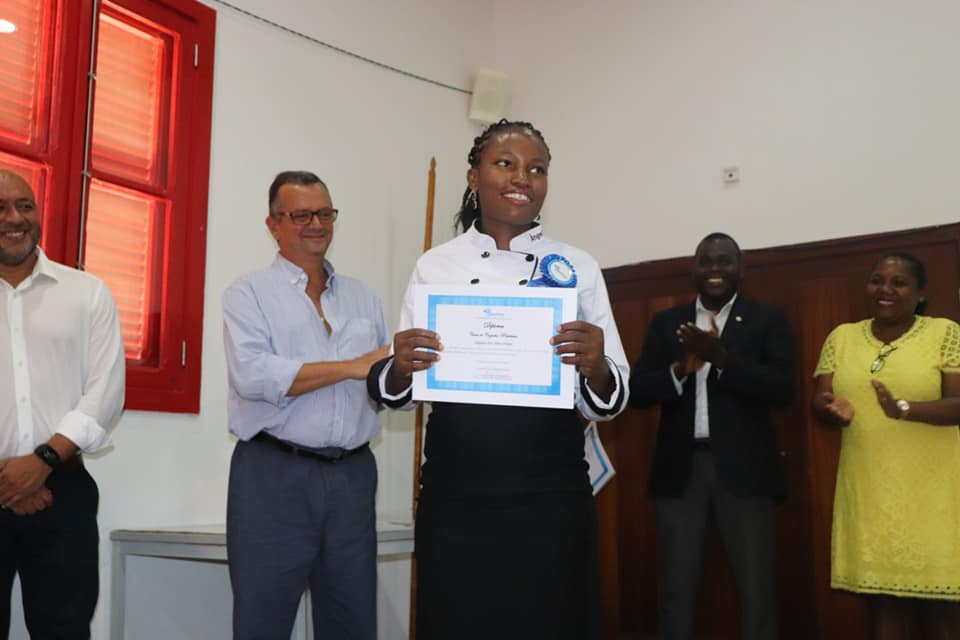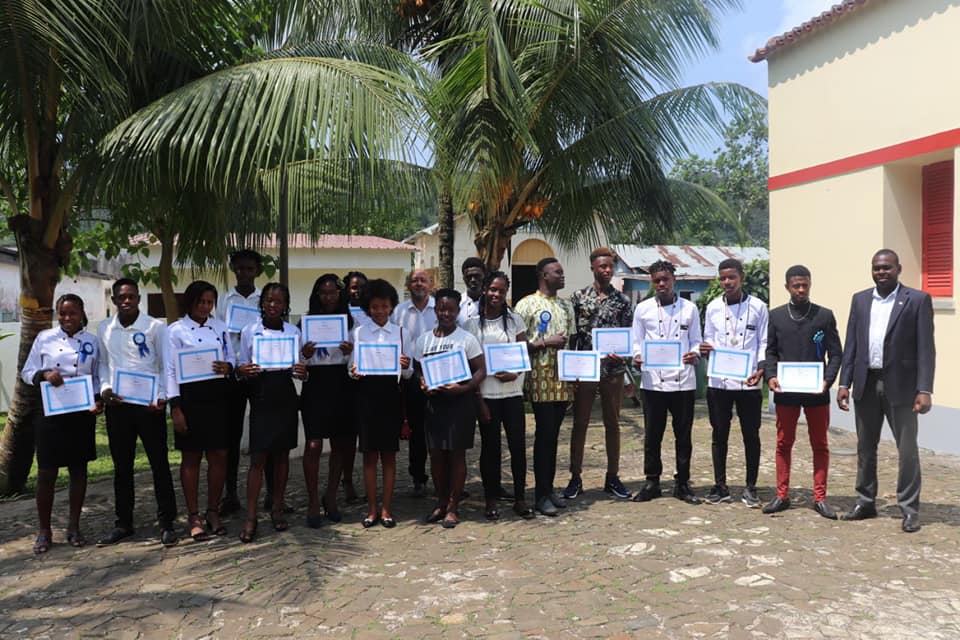 Vocational Training Scholarships in the Hospitality Industry
Triangular-cooperation initiative for the enhancement of the São Tomé and Príncipe tourism sector
Vocational Training Scholarships in the Hospitality Industry
Triangular-cooperation initiative for the enhancement of the São Tomé and Príncipe tourism sector

Challenges
Tourism is a strategic sector for the development of São Tomé and Príncipe, with strong potential to contribution to the improvement of living conditions through the promotion of socioeconomic transformation, notably in education, health and infrastructure development. National authorities have concentrated on stimulating tourism since 2000, however, the country lacks institutional structures, capital and the capacity to train skilled human resources in this sector.
Human resources for hotels, restaurants and other tourism activities are not suitably trained and qualified to ensure quality tourism with high growth potential. If not properly capacitated, human resources will be one of the main bottlenecks that limit the future high-quality and competitive development of this strategic sector in the country.
Towards a Solution
The project Vocational Training Scholarships in the Hospitality Industry is a triangular cooperation initiative facilitated by the Government of Luxembourg, implemented by Cabo Verde’s School of Hospitality and Tourism (Escola de Hotelaria e Turismo de Cabo Verde, EHTCV) and supported by the Embassy of Luxembourg in Cabo Verde and the Embassy of Cabo Verde in São Tomé and Príncipe. The project enhances São Tomé and Príncipe’s tourism capacity through offering vocational training scholarships to persons from that country at EHTCV in Praia, the capital of Cabo Verde. By improving access to education and thus employment, the project contributes to poverty reduction.
Trainees are selected based on their profiles and motivations, through evaluation of their educational backgrounds and via face-to-face interviews. The initiative enrolled 61 participants in 2017 and 2018 (39 percent of which are women). With a duration ranging from eight months to two years (including an internship period), trainees study, among other subjects, cooking and pastry, pastry and bakery, catering and drinks, and hotel management, all of which are certified by Cabo Verde’s National Qualification System. During their stay in Cabo Verde, the fellows receive full-board and accommodation at the school’s student residence in the capital Praia.
After completing their training, two thirds of the graduates have thus far been absorbed in the São Tomé and Príncipe labour market in the tourism sector. This triangular cooperation initiative has also garnered international recognition for EHTCV as one of Cabo Verde’s centres of excellence, with a strong potential role in South-South exchanges.
Established in 2011 as a state-owned enterprise, EHTCV now envisages setting up a dedicated department to further advance the school’s internationalization and promote the inbound and outbound mobility of trainers and students, ensuring the project's sustainability. Acknowledging the importance of professional stays abroad for the building of new skills and know-how, the success of the initiative paves the way for similar EHTCV partnerships with other developing countries (notably Portuguese-speaking and West African nations) and for the replication of the training-scholarship model by other Cabo Verdean reference centres.
Contact Information
Countries involved
Supported by
Implementing Entities
Project Status
Project Period
Primary SDG
Primary SDG Targets
Secondary SDGs
Secondary SDG Targets
Similar Solutions
| NAME OF SOLUTION | Countries | SDG | Project Status | |
|---|---|---|---|---|
Accelerating the Implementation of African Union Treaties in São Tomé and Príncipe South-South learning from the Beninese judicial system’s experience in the application of human rights treaties to its national law |
Cabo Verde, Luxembourg, Sao Tome and Principe | 05 - Gender Equality | Completed | View Details |
Accelerating the Transformational Shift to a Low-Carbon Economy in Mauritius Towards supplying 35 percent of the country’s energy needs with renewables by 2025 |
Cabo Verde, Luxembourg, Sao Tome and Principe | 05 - Gender Equality 09 - Industry, Innovation and Infrastructure 13 - Climate Action | Ongoing | View Details |
Access to Justice through e-Services and Dematerialized Case Management Scaling up connectivity and unlocking the digital potential of judicial institutions to enhance access to justice for all |
Cabo Verde, Luxembourg, Sao Tome and Principe | 05 - Gender Equality | Completed | View Details |
Action Plan on Gender Equality and the Empowerment of Women at the National Level in the Arab Region Mainstreaming gender action within national institutions in the Arab region |
Cabo Verde, Luxembourg, Sao Tome and Principe | 05 - Gender Equality | Completed | View Details |
Adapting Digital Payment to Initiate Rapid Response During Pandemic Bangladesh government disbursed cash aid to 5 million most vulnerable families through mobile financial service in order to minimize the financial impact during COVID 19 within the shortest period of time. |
Cabo Verde, Luxembourg, Sao Tome and Principe | 03 - Good Health and Well-being 05 - Gender Equality | Completed | View Details |


